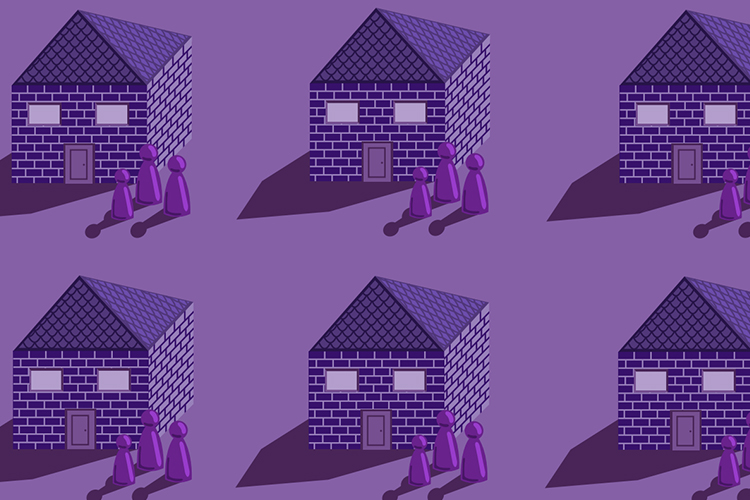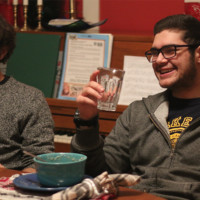
Hannah McCollum stands in the middle of the Beaumont Middle School gym as red and yellow foam dodgeballs fly past her. She notices a new student standing alone across the gym. McCollum approaches the girl and introduces herself, asking where she previously attended school.
The girl tells McCollum that she had actually been homeless, and had bounced around from school to school before coming to Beaumont. “In all honesty, I was shocked because I never even thought of that as a possibility where a student could be homeless,” says McCollum.
Although the girl ended up transferring schools that same month, the conversation stayed with McCollum. “It changed how I thought about homelessness, knowing that it affects people like me who are my age and who I could be friends with,” she says.
McCollum’s perspective is not unique. Many students at Grant High School are unaware of the struggles their peers may be facing. “I don’t think that that’s something that a lot of people associate with teenagers or high schoolers,” says junior Theo Brabish.
In the 2016-17 school year, Oregon had the fifth highest rate of homelessness among students in the country, according to the National Center for Homeless Education. There were 24,322 homeless students across the state during that school year, with approximately 1,800 enrolled in Portland Public Schools (PPS.)
PPS defines homeless students as those without fixed, regular and adequate nighttime residence, which can vary greatly depending on the individual. Students can be classified as homeless if they are “staying with relatives or friends, in inadequate conditions, living in a garage, basement or other space not designed for sleeping, couch surfing, living in an RV, car, tent, or on the street, in a shelter or motel.”
Grant currently enrolls seven homeless students. Often, students struggling to find adequate or fixed housing will require additional support in obtaining an education. “Anyone who experiences homelessness also experiences a high degree of instability which translates to their ability to access education,” says Angela Pratt, the Development and Communications Manager at New Avenues for Youth, a nonprofit dedicated to helping homeless youth.
The McKinney-Vento Homeless Assistance Act, formerly known as Title X in PPS, was passed by Congress in 1987 and requires school districts to provide extra assistance to homeless students.
The program “establishes the rights of homeless students to access and enrollment in PreK-12 public schools; provides assistance and training to districts to identify and serve homeless children and youth,” says Dona Bolt, the State Coordinator of the Education of Homeless Children and Youth Program for the Oregon Department of Education. PPS’ McKinney-Vento program also provides homeless students with winter coats, food, hygiene supplies, academic fees, graduation materials and laundry assistance.
Unaccompanied students living without a parent or legal guardian are also considered homeless. In the 2017-18 school year, PPS classified 155 students as unaccompanied youth.
“There’s a lot of students that are unaccompanied youth that identify as gay, lesbian, queer or (transgender) and they just had such conflict at home that they’ve either left voluntarily or parents have kicked them out,” says McKinney-Vento Program Lead and Jefferson cluster liaison Marti Heard. “A lot of times, teen parents sometimes end up as homeless unaccompanied youth,” he adds.
A lack of regular and dependable housing significantly affects students in their ability to obtain a quality education. According to the Oregon Department of Education, 79.5 percent of Oregon non-homeless students attend school regularly, while only 57.6 percent of homeless students are regular attendees. Additionally, 69.7 percent of homeless students are not meeting PPS proficiency standards in their common core subjects: mathematics, English language arts and science.
“If you’re a young person who is experiencing homelessness, you may not even be able to attend school on a regular basis because … your priority is to try and survive and find things to eat and have your basic needs met first,” says Pratt.
With increased distances to school, even with district-provided transportation, homeless students are generally unable to continue to attend school regularly and learn on a regular school schedule like their peers. “We often see big drops in attendance and sometimes we do see drops in grades or in students getting, especially high school students, getting the credits they need,” says Heard.
Lack of computer or internet access at home, less availability and space to complete homework assignments and less opportunity for out-of-school learning experiences also contribute to homeless students falling behind in school.
“Kids often feel stigmatized by being homeless. Frequently, it makes students worry about their living situation and sometimes can affect their self-esteem as well. As a result, they can experience changes in their academic performance, motivation, focus and mental health,” says Marcela Butterfield, the Grant cluster’s McKinney-Vento liaison.
The main focus of the McKinney-Vento program is enabling students to remain in their familiar school communities, even if they have moved out of district boundaries or do not have a permanent home address, which is typically necessary for enrollment. “If they’re moving around and the housing is unstable, we want to keep the school piece as stable as possible,” says Heard.
One way in which the McKinney-Vento program ensures students can stay at their original schools is through providing transportation to and from campus. Students can be added to Special Education bus routes and offered TriMet passes or gas reimbursements. If a student has been displaced further from their home school, sometimes cabs or ride-booking services, such as Uber, can be provided.
Liaisons work directly and personally with students and school staff to provide homeless students with these resources. Every district in Oregon is required to employ at least one liaison; in PPS, five liaisons work with different clusters of the district. Since McKinney-Vento renews eligibility for the program each academic year, students can only be provided services during the school year. During the summer, liaisons work to connect students and their families with summer school, job and food programs.
At the beginning of each school year, students and their living situations are re-evaluated to determine if they still fit the criteria to receive aid from the McKinney-Vento program. These criteria are solely based off of whether or not a student resides in an adequate nighttime residence. If a student does not meet the requirements, they can still be considered low-income students and receive free breakfast and lunch, and utilize other resources offered at Grant such as the Four Star Hunger Project, which sends students in need home with backpacks full of food every weekend.
At Grant’s Marshall Campus, there is also a Clothing Center where students in need can receive free clothing up to two times a year if referred by a PPS principal or school secretary. Students are allowed to pick up clothing once before and once after winter break.
Since 2014, the population of homeless students in Portland has grown by over seven percent, which can be attributed to housing prices in the Portland metropolitan area. “Currently, there are many students facing homelessness due to rental increases and lack of affordable housing. But other factors that result in homelessness include domestic violence, mental health issues, substance abuse, loss of employment, divorce or other family instability, unexpected medical or other bills,” says Butterfield.
In the years following the 2008 economic recession, Portland has attracted an abundance of new residents and has grown by approximately 10,000 people per year since 2010.
With limited housing, the cost of living has significantly increased, and many Portlanders are being forced out of their homes, and sometimes onto the streets or into shelters. With this spike in housing prices, homelessness rates have increased by nearly 10 percent over the last two years, according to The Oregonian.
This issue has sparked controversy between the homeless population and the current mayor of Portland, Ted Wheeler, with 52 percent of arrests involving homeless citizens, according to an analysis by The Oregonian. While much of Portland’s progressive side desires safe sleeping policies and less restriction on the homeless, some worry that homelessness negatively impacts Portland’s tourism and livability.
While homelessness has become a hot topic politically, many forget that it can affect their peers
as well. “A lot of times I just forget that there are students who are homeless at Grant,” says McCollum. Grant’s seven homeless students are a decrease from the last two years, with 18 homeless students in the 2016-17 school year and 12 in the 2017-18 school year. “I’m quite surprised that we have a decrease this school year just because of where we are society-wise, like just with Portland’s housing market and the government shutdown recently,” says Grant’s social worker, Catrina Knoerzer.
Knoerzer acts as the primary contact for students facing homelessness at Grant, meeting with them several times per week and providing necessary resources. She also runs the school’s Four Star Hunger Project.
The issue of homelessness, especially among students, is often ignored for fear of discomfort. However, continuing to dismiss the issue in schools results in continued ostracization of homeless students and widens the divide between students from different socioeconomic backgrounds.
“From the very wealthiest to the ones that have the highest level of poverty, it really does affect across the board. All the schools are impacted by this,” says Heard. “They’re sitting next to kids that are homeless, whether they realize it or not.”
Grant High School senior
Anonymous, she/her
So basically, when my parents got divorced … my dad, I didn’t really know where he lived most of my childhood. I expected it was just with friends and stuff, but he didn’t graduate from college when he was in [name of country removed for source’s privacy], he just moved to America.
So he didn’t have a college degree, and then he’s already another person of color, and so I think
it was (when I was in) third grade he lost his job.
So then he lost his apartment after not having his job. He lost his apartment and he had to move to a cheaper apartment, and then finally he lost that apartment, and he started living in his car.
We didn’t have a place to see our dad anymore because he lived out of his car, and so he would come over every Tuesday and Thursday night and pick us up from school and just be in our house. And then every night when he would leave, I would just watch him basically make his bed in the back of his car … we would never be allowed into his car and … me and my brother felt like we couldn’t ask him where he lived because he was such a private man for my entire life.
All my best friends, all their parents have worked at Nike or were nurses or doctors. They’re all these really high-up-there positions, and then I would get asked, ‘Oh, what does your dad do for a living?’ and I would just say, ‘I don’t know.’ Or like, ‘Where does he live?’ and it’s just like, I don’t know. And as a little kid it’s … hard to deal with.
In middle school, it was really hard because there was more of just like, the relationship with my dad was really bad. And then it was just another burden on top of that … He did a lot of things that I didn’t approve (of), and then him having this burden on him where he is homeless, he is looking for a job, and then that kind of makes you feel bad for not liking him as a person … You’re supposed to love your dad and all this stuff. And that pressure of feeling like you need to have this perfect family life.
And I think the scariest part about it … I don’t know where he’s sleeping, that was just my assumption that he was living in his car, but I don’t know where he’s parking his car … it’s really scary thinking about (that). At night, I remember watching him leave and then being like, ‘Now where is he going to go to go sleep in his car?’ And then there were those occasions where his car was broken into or his car was stolen, and it’s like, what if someone comes by and sees my dad’s car, just like a brown man in his car, and is just like, ‘Oh … this man shouldn’t be here, he’s a piece of trash,’ and just kill him, God forbid, or just anything. Anything extreme could happen.
Also, my dad is really, really street smart, and I remember as a little kid, we walked downtown and even to this day, we’ll walk downtown and he’ll know almost every homeless person on the street. And he’ll just say ‘hi’ to them and just talk to them, and they’ll all know him. And so it was really more of just a mystery, and not really knowing where he was going after I said my
goodbyes to him.
Grant High School senior
Anonymous, he/him
I mean really, (being classified as homeless) didn’t really start until this year when I, my dad and I, moved out of my grandparents’ house and we didn’t really have anywhere to go, didn’t really have a whole lot of money. We were going through hotels and slept in the truck maybe a few times. Three or four maybe at the MAX. It was just (feeling) unsure of where to go next and not a whole lot of money on where to stay really … The housing in Portland and the issue of cost really, with a single parent, I guess. Not being able to afford a whole lot.
I mean yeah, I wasn’t really expecting to have to move out of my grandparents house. It was kind of sudden, we kind of had an argument … and that was why I guess.
In the mornings, I’d pack because I’m kind of a clean freak, to be honest. And the hotel bathrooms (were substandard) because we were having to stay in kind of the lower end of motel you’d ever find pretty much. Or the two nights we were in the truck, I’d have to shower in a Taco
Bell or a McDonald’s, do my hair or wash my face for acne. It was just the instability.
I have at least two weeks of missed school … I took into my own hands, the point of telling my teachers, because I worry about my academics myself, really. I don’t know that there’s a whole lot that I’d want other students to know about (being homeless) … just because it separates you from the group even more.
The instability in my housing has made me jump all over the place in what I wanted to do (after high school.) Originally, I was planning on … trying to be a fighter pilot – some kind of fixed wing pilot in the military … I think that’s the reason why I couldn’t (become a pilot) really, I had to focus on my schoolwork as well. I couldn’t be there everyday with my schoolwork and really (being homeless) kind of changed my personality.
I used to be able to hold myself a lot more accountable and be able to do my work a lot well, and around that time I started slipping up really, and not really being able to do my schoolwork as easily. And the idea of being a pilot shifted, and now it’s gone to the Army.




